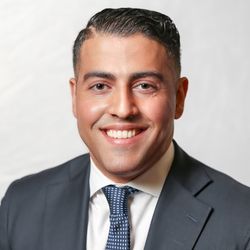
OR WAIT null SECS
Ugochi Ohuabunwa, MD: Preparing Patients for the Postdischarge Transition of Care
During this discussion, Ohuabunwa discussed additional takeaways from her ACP conference talk on postdischarge care and other tips for internal medicine physicians.
In this segment of her interview, Ugochi Ohuanbunwa, MD, discussed some of the points made in her American College of Physicians (ACP) Internal Medicine Meeting presentation in Boston. The HCPLive editorial team asked her about several elements, including how hospitalists prepare for the postdischarge transition of care, when to initiate "Goals of Care" conversations, and more.
Ohuanbunwa is known for her work as professor of medicine of the division of geriatrics and gerontology at Emory University in Georgia. Ohuabunwa was given several questions regarding the major takeaways from her ACP talk titled ‘Inpatient Geriatrics Management: Assessing Frailty and What to Avoid.’
“One of the things that's very important to understand in an older adult is the fact that there are multiple things that contribute to their post discharge,” Ohuabunwa explained. “So besides the actual reason for which the patient is there, the patient's functional status at the time of discharge and their cognitive status at the time of discharge would also determine how well they do. It's very important for the hospitals to do an assessment of the patient's functional status of the patient's cognitive status prior just prior to discharge, because that helps guide the discharge setting to which the patient should be discharged to some settings.
Ohuabunwa added that if a patient has very significant functional decline, it may be difficult and if left alone then it may be difficult for them to cope when they are discharged.
“Getting a detailed social history as to what their social support is very helpful,” she said. “Sometimes an older adult could say ‘I live with my son,’ but the son is out of the house 12 hours of the day and that patient if determined based on the functional assessment and cognitive assessment that they need much more help, then it means that going home is not really very appropriate. So it is very important for the hospitalist to do those assessments.”
Ohuabunwa was also asked about when hospitalists should initiate ‘Goals of Care’ conversations with such patients.
“In general, some Goals of Care discussions are best done in the outpatient setting, because that helps to prepare the patient in case they're hospitalized emergently,” she explained. “Sometimes, it's difficult to have those discussions in the inpatient setting. But on the other hand, over the last few years the Institute of Healthcare Improvement, the American Hospital Association, and the Catholic Hospital Association…came up with what's called ‘four M’s,’ and one of those ends at the four M's are essentially to help guide what you do with an older adult. The first ‘m’ is what matters most to that older adult.”
For additional information from Ohuabunwa’s ACP presentation, view the full interview segment posted above.
The quotes contained in this description were edited for the purposes of clarity.


